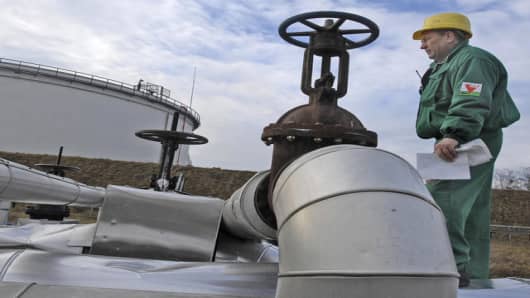An oil price "bubble" was not due to any shortage but was fuelled by global political tensions, a leading Iranian oil official told the state broadcaster.
"OPEC is not very happy with the existing situation that shows a lack of stability in world oil markets," Javad Yarjani, head of OPEC affairs at Iran's Oil Ministry, was quoted as saying on the Web site of the state broadcaster.
U.S. crude hit a record high of more than $93 a barrel this week but has since dipped below $90 on recovering Mexican oil output and an expected rise in weekly U.S. crude stocks.
Oil has surged from below $70 in mid-August on a combination of factors, including escalating tension in the Middle East as well as an influx of investor capital.
Yarjani said the market was well supplied, a position repeated by Iran's caretaker oil minister Gholamhossein Nozari, nominated by the president as the permanent minister.
"I believe there is enough oil in the market," Nozari was quoted as saying by the semi-official Fars News Agency.
"After oil prices increased, the price of contracts, construction and consulting engineering have also increased and thus it has imposed heavy expenses on producing countries."
OPEC President Mohammed bin Dhaen al-Hamli said on Wednesday the Organisation of Petroleum Exporting Countries would always step in to meet supply shortfalls but an increase was not on the agenda for OPEC's informal talks in Riyadh in mid-November.
Yarjani said of the price surge: "The bubble of oil price rises ... will burst one day and there is a possibility that oil prices would go down as geopolitical issues ease."
"The current rise in oil prices in global markets is not because of lack of producers' supply and large demand by consumers but rather it is because of psychological issues caused by stress and geopolitical concerns in the world."
He also said producers would not welcome prices climbing to $100, which would take oil to its inflation-adjusted high from April 1980, the year after the Iranian revolution.
"On some occasions, because of non-expert comments, it is believed that if oil prices reach $100 it is a dream for producing countries. But it is not a dream at all and this issue should be handled with caution," Yarjani said.
"An increase in oil prices would cause people's expectations (in producing states) to go up and if it is not handled properly it will create more serious problems for producing countries," he added.
Analysts say higher oil prices encourage more efforts at conservation by consumers and the development of alternative fuels, which in the long run could dent demand for crude.


